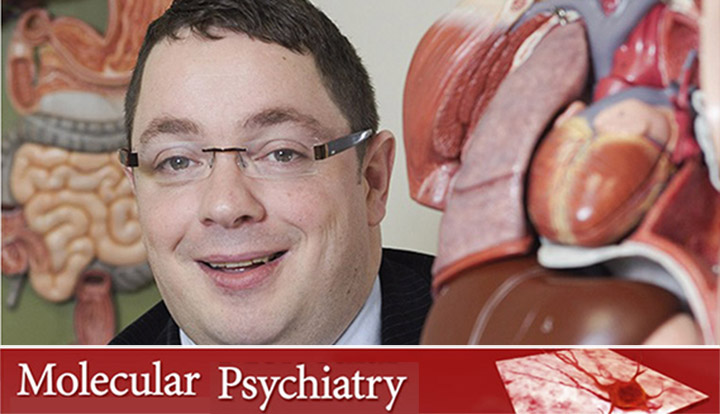A Gut feeling about Autism - UCC scientists show that gut bacteria is essential for the development of normal social behaviours in research published today in Molecular Psychiatry.

Professor John Cryan, Head of the Department of Anatomy & Neuroscience, UCC Image: Tomás Tyner, UCC.
University College Cork (UCC) scientists show that gut bacteria is essential for the development of normal social behaviours in research published today in Molecular Psychiatry.
Autism and other neurodevelopmental disorders are characterized by alterations in social behaviour. It is clear that gastrointestinal disturbances are also very common in autism spectrum disorders (ASD). However, the role of gut bacteria in ASD is controversial.
Now scientists at the Alimentary Pharmabiotic Centre in UCC have shown that, at least in animal models, gut bacteria are essential for the development of normal social behaviour. This research takes advantage of the ability to maintain mice permanently without microbiota in their gut (germ-free) and examined their behaviour in adulthood. Mice, like humans, are a social species and have a natural propensity to seek out the security and pleasure afforded by stable social scenarios. However, the Cork scientists revealed significant social impairments in mice lacking microbiota, particularly in males, as indicated by a lack of the normal preference for time spent in a chamber containing a mouse versus the alternative empty chamber. This was accompanied by reduced preference for novel social situations, where microbiota-deficient mice did not demonstrate the normal increase in time spent investigating a novel over a familiar mouse, which resembles social cognition deficits observed in patients with neurodevelopmental disorders. Children with autism exhibit increased repetitive behaviours and microbiota-deficient mice also show enhanced repetitive grooming in a novel situation. Interestingly, when bacteria was introduced after weaning it reversed the observed social avoidance and repetitive behaviours, but had no effect on social cognition impairments.
The research was led by Professor John F Cryan and carried out by a postdoctoral scientist Dr Lieve Desbonnet in collaboration with Dr Gerard Clarke, Professor Fergus Shanahan and Professor Ted Dinan at the Alimentary Pharmabiotic Centre in UCC.
Overall, this study provides exciting new evidence that the microbiota is crucial for the programming and presentation of a distinct repertoire of behaviour that is disturbed in neurodevelopmental disorders such as autism and schizophrenia and with a similar male preponderance. A better understanding of the mechanisms underlying these social deficits, could potentially lead to the emergence of novel and more effective therapies to combat such symptoms.
“Although we must caution that these findings emanate from experimental models they clearly highlight that the absence of critical bacteria during early life affects behaviours relevant to autism and thus further investigations into how the microbiota affects the wiring of the brain are required”, said Professor John F Cryan, senior author on the publication and Head of the Department of Anatomy & Neuroscience at UCC.
The research is published in the leading international psychiatry journal Molecular Psychiatry “Desbonnet L, Clarke G, Shanahan F, Dinan TG & Cryan JF “Microbiota is essential for social development in the mouse”
Cork NeuroScience CNS Centre - Integrating Clinical and Basic Research
Contact us
Cork NeuroScien floor,
